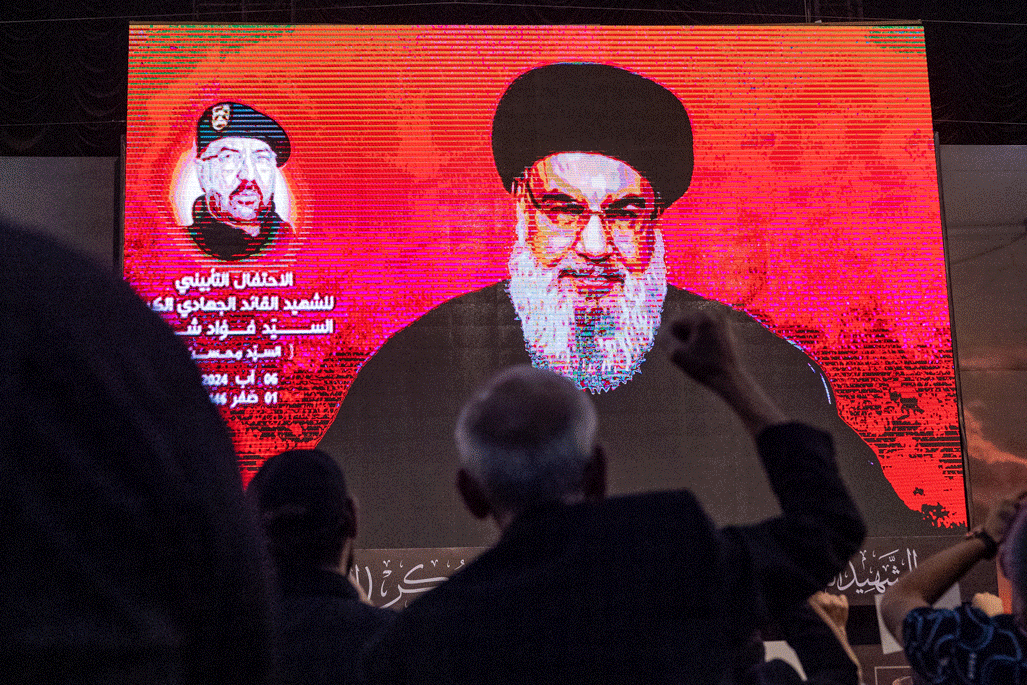Hosted by Faisal Al Yafai
Featuring Yair Wallach and Kareem Shaheen
Produced by Finbar Anderson
Listen to and follow The Lede
Apple Podcasts | Spotify | Podbean
Even among his enemies, Hezbollah leader Hassan Nasrallah could stir surprising emotions. “Israelis had a certain awe of him, a certain respect, because he proved himself to be someone who, when he threatens, he usually delivers,” Yair Wallach, reader in Israeli studies at the School of Oriental and African Studies (SOAS) in London, tells New Lines’ Faisal Al Yafai on The Lede.
While the Israeli leadership was less concerned about other, regional Arab adversaries, “with Nasrallah, it wasn’t like that at all. He was seen as a real, formidable threat and also someone that knew how to push the buttons of Israeli society,” continues Wallach.
“There was no figure that commanded the same hold over the public sphere in both Lebanon and the rest of the region.”

For many in Israel, Nasrallah was a known quantity, preferable to possible chaos without him at the head of Hezbollah. “There were people in the Israeli security establishment saying it’s better to have him there than someone we don’t know very well,” says Wallach.
Nevertheless, in the weeks and months leading up to his assassination on Sept. 27 Nasrallah may have displayed a certain naivety that left him, and Hezbollah, open to an attack by Israel. “I think they failed to take on board the fact that their communication system was compromised on such a level,” says Wallach.
“The fact that [Israel] was able to launch so many attacks on the high command and the leadership of Hezbollah indicates that they had an unparalleled level of intelligence, which means that it wasn’t a one off, and that’s something that I think Nasrallah probably refused to accept.”
New Lines’ Middle East editor, Kareem Shaheen, agrees with Wallach that Hezbollah may have misread its opponent. “That goes to the core of the miscalculation that Hezbollah made in thinking they can play by the same rules that have governed their interactions and skirmishes with the Israelis for years now,” Shaheen says. “The reality is that it seems like the Israelis have been preparing for something like this for some time.”
Nasrallah, says Shaheen, had a seismic impact on the region’s consciousness. “Even his rivals, even the people who absolutely hated him, grew up in an Arab world that was shaped by the ideology that he carried on his sleeve.”
The Hezbollah leader had a flair for showmanship, which, combined with the group’s guerrilla prowess against Israel, meant that the Arab world would hang on his every word — whether they supported Nasrallah or not. Many still recalled the “Hanit Surprise” from the 2006 war, when Nasrallah, live on television, announced a cruise missile attack on Israel’s flagship destroyer off the coast of Lebanon.
“You’re looking here at an army that Arabs have been told is completely invulnerable … and you see this militia leader on television — presumably from his hiding place — being able to synchronize the viewership with an attack that was ongoing at that moment against a key Israeli strategic asset. It’s showmanship of the highest caliber,” says Shaheen.
Shaheen pinpoints Hezbollah’s entry into the Syrian Civil War on the side of Bashar al-Assad as a turning point in the way it was seen in the region. “A party that was supposed to be a defender of the weak … instead became an oppressor itself.”
The death of their leader is a huge blow for Hezbollah, says Shaheen. “Nasrallah as a figure is irreplaceable from within Hezbollah’s current cadre of leaders,” he says. “There was no figure that commanded the same hold over the public sphere in both Lebanon and the rest of the region.”
Hezbollah is not defeated, Shaheen says, but its future is uncertain. “The party is by no means gone, even if its weakened,” he says. “The next few months are going to be crucial in terms of determining how it absorbs the aftershocks of this absolutely monumental moment.”
Further reading: The Day After Hassan Nasrallah


